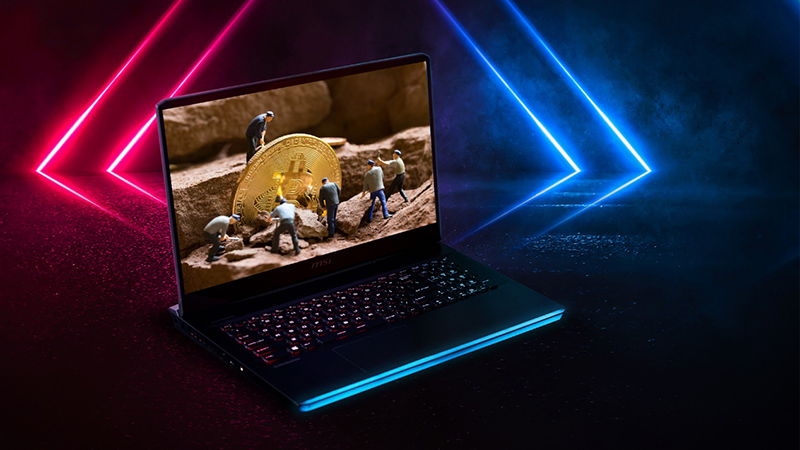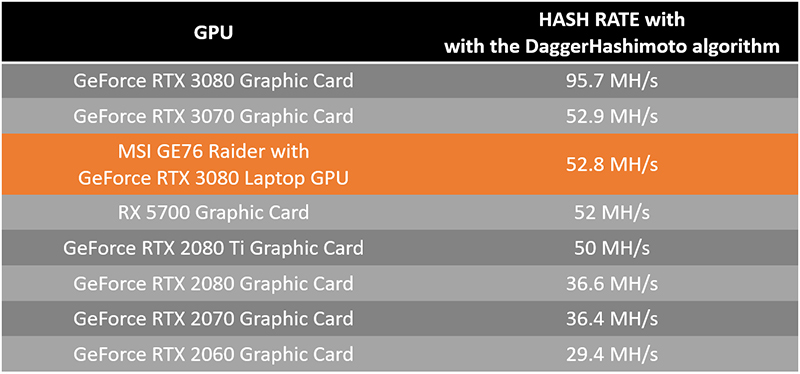MSI demonstrates cryptomining performance on new RTX 3080 laptop - then deletes post
We can't imagine why

Sign up for breaking news, reviews, opinion, top tech deals, and more.
You are now subscribed
Your newsletter sign-up was successful
MSI has deleted a two week old blog post on their site demonstrating the mining performance of their latest MSI GE76 Raider gaming laptop with a mobile RTX 3080 GPU, presumably to avoid the wrath of gamers struggling to get their hands on the hard-to-find Nvidia GPUs.
Helpfully flagged by TechPowerUp, the now-deleted post - which you can read here courtesy of the Internet Archive's Wayback Machine - explains that the company was conducting a month-long test to see how much Bitcoin its latest gaming laptop could generate.
- We show you where to buy an Nvidia RTX 3080
- We also have hints on buying an RTX 3090
- Check out our list of the best mining GPUs
The post, dated February 25, is a legitimate examination of a gaming laptop's efficiency at mining cryptocurrency and isn't a pointless exercise - it's actually quite informative and does an excellent job explaining what costs are associated with cryptomining, how it's done, how profit is determined, and how GPU mining performance is calculated - namely something known as its hashrate.
In the end, MSI calculated that the RTX 3080 in the GE76 Raider, using the DaggerHashimoto algorithm, produced a hashrate of 52.8 MH/s, or just 0.1 MH/s behind a desktop version of the RTX 3070 and about 55.17% of a desktop RTX 3080. It also beat out the desktop RTX 2080 Ti by 2.8 MH/s.
We have reached out to MSI for comment and will update this story when we heard from the company.

How cryptomining is swamping the GPU conversation, rightly or wrongly
With the prices of Bitcoin and Ethereum continuing to climb, mining the valuable cryptocurrency has become very much in vogue these days - even if hopes for breaking even at this point are very slim. Still, people can't help but get swept up in a gold rush, and that can make buying a shovel for work around the house a frustrating challenge.
Nvidia said in its most recent earnings call that it wanted to see more graphics cards get into the hands of gamers and have taken steps to limit the hashrate of the RTX 3060 and are rumored to be looking at doing the same for the upcoming RTX 3080 Ti. It looks like some cryptominers in Asia have already found limited workarounds to mine some cryptocurrency on the RTX 3060 and with RTX 3000-series laptops being bought up in bulk for cryptomining, tempers are running hot among gamers who are getting locked out of buying the next-gen graphics cards.
Sign up for breaking news, reviews, opinion, top tech deals, and more.
How much of the problem is attributable to cryptomining is still an open question, however. Nvidia estimates that cryptomining accounted for between $100 million and $300 million in Q4 revenue, which isn't a whole lot when compared to overall gaming revenue of $2.5 billion - the vast majority of which came from graphics cards.
Even their upcoming cryptomining processors, a dedicated solution to cryptominers diverting graphics cards meant for gaming to mining Ethereum and other currencies, are only expected to bring in $50 million to $100 million in revenue next quarter.
The main culprits to the lack of graphics card stock, ultimately, are the gamers themselves. Demand for these cards is enormous, even more than with last gens Turing cards which had a much higher price point, relatively speaking. Being cooped up inside all year definitely hasn't helped things, so as the demand for these cards far outpaces available supply, tempers are bound to flare.
Cryptominers are very visible targets for that anger, even if they make up only a small part of the problem, and even a hint that a manufacturer might be supportive of cryptominers using their products is met with a wall of rage online. So, if we're being charitable - which we are - it's little wonder then that MSI decided that maybe now wasn't the right time to publicize any technical exercises involving their latest RTX 3080 laptop and Bitcoin.
- Stay up to date on all the latest tech news with the TechRadar newsletter

John (He/Him) is the Components Editor here at TechRadar and he is also a programmer, gamer, activist, and Brooklyn College alum currently living in Brooklyn, NY.
Named by the CTA as a CES 2020 Media Trailblazer for his science and technology reporting, John specializes in all areas of computer science, including industry news, hardware reviews, PC gaming, as well as general science writing and the social impact of the tech industry.
You can find him online on Bluesky @johnloeffler.bsky.social